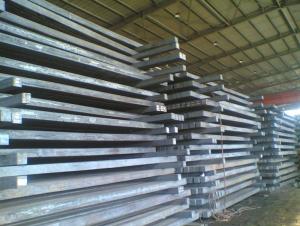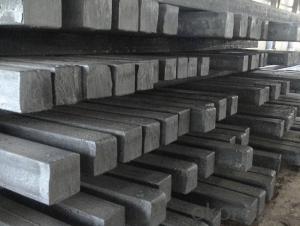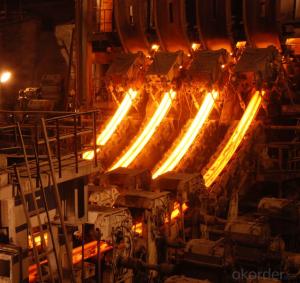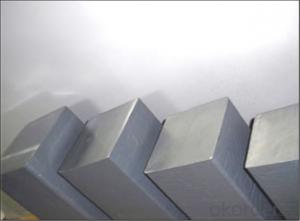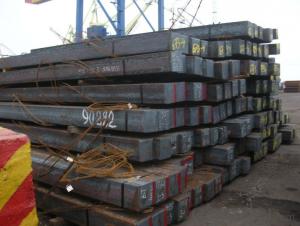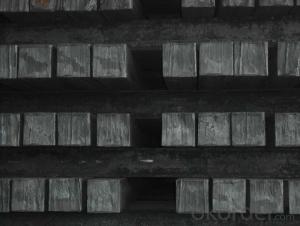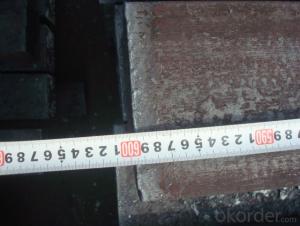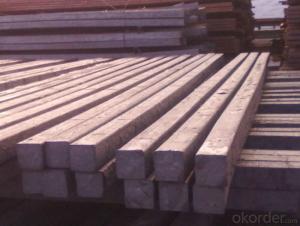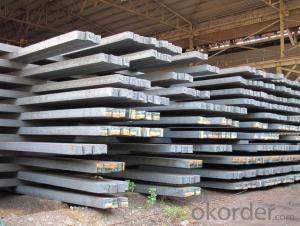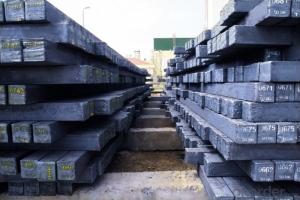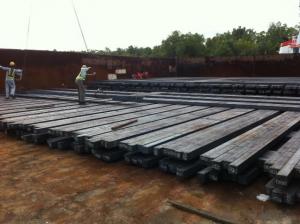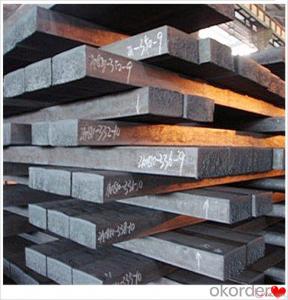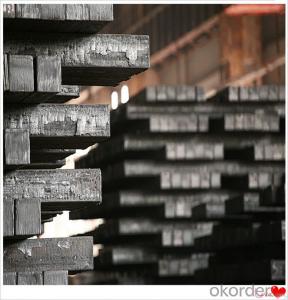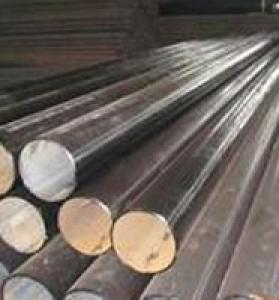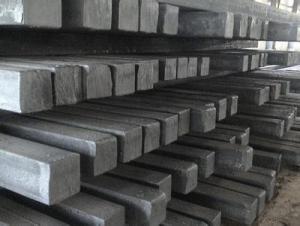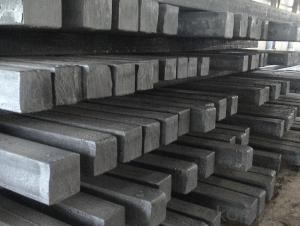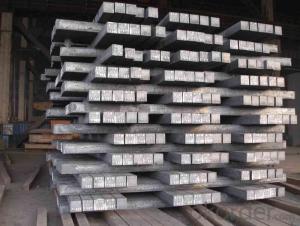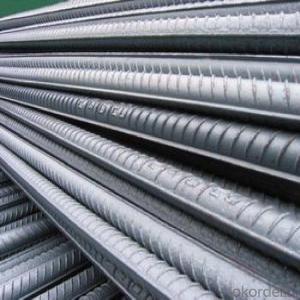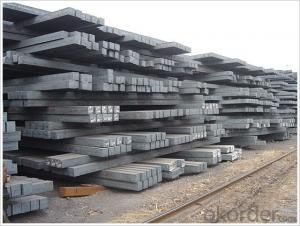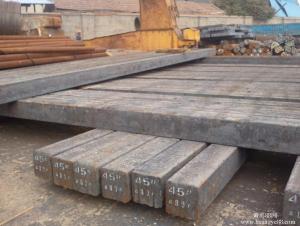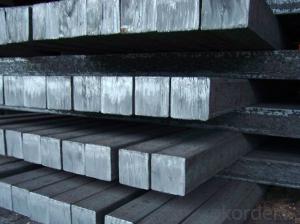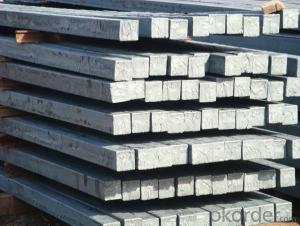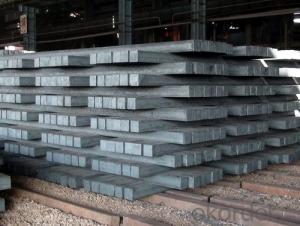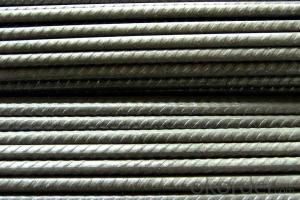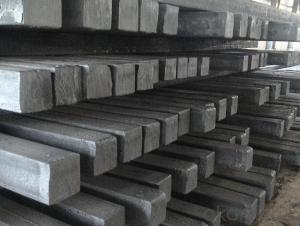Square Steel Billet Q235 3SP Grade Prime Quality 7#
- Loading Port:
- Tianjin
- Payment Terms:
- TT OR LC
- Min Order Qty:
- 2000 m.t
- Supply Capability:
- 50000 m.t/month
OKorder Service Pledge
OKorder Financial Service
You Might Also Like
Description of Square Steel Billet Q235 3SP Grade Prime Quality 7#
M. S. Billets are used for rolling of TMT Re-Bars of Fe415 and Fe500 Grade and various other structural steel products.
CRS Billets are used for rolling of CRS TMT Re-Bars.
Special Alloy Billets are used for rolling of any special grade TMT Re-Bars like Earthquake resistant TMT Re-Bars and for special grade structural steel products.
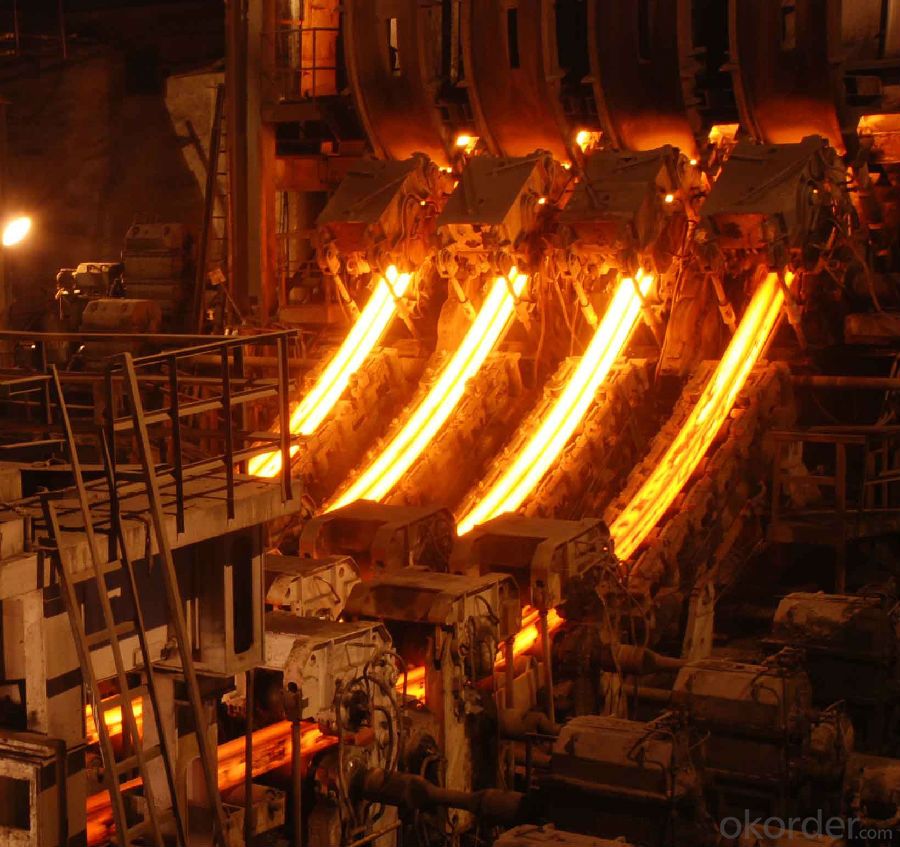
Main Feature Square Steel Billet Q235 3SP Grade Prime Quality 7#
Raw elements(C,Fe,Ni,Mn,Cr,Cu.)---Smelted ingots by AOD finery---hot rolled into black suface---pickling in acid liquid---cold drawn----polished by automatically machine--- cutting into pieces---checking quanlity
Applications of Square Steel Billet Q235 3SP Grade Prime Quality 7#
Widely Used in the areas such as Stainless Steel Fasteners, Chains, Kitchen and Sanitary wares, Furniture handles, Handrails, Electroplating and Electrolyzing pendants, Foods, Electron, Petroleum, Construction and Decoration, etc. Products have a high strength after cold-working. Electronic products parts, Medical appliance, Springs, Bus Inside and Outside packaging and building, Street Lamp Posts, etc. Decoration materials and Outdoor Publicity Billboard. Used for the products which have the Anti-Stress Corrosion requirement. Electron Products, Table-wares, Bolts, Nuts, Screen Meshes, Cumbustors and so on.
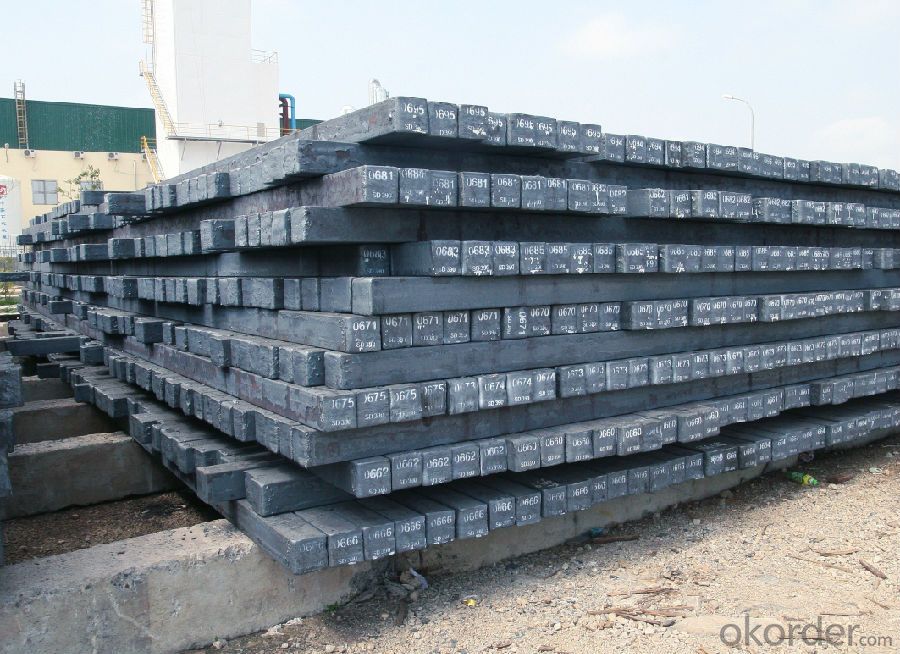
Specifications of Square Steel Billet Q235 3SP Grade Prime Quality 7#
| Standard | C(%) | Mn(%) | S(%) | P(%) | Si(%) |
| Q195 | ≤0.12 | ≤0.50 | ≤0.040 | ≤0.035 | ≤0.30 |
| Q235 | ≤0.20 | ≤1.40 | ≤0.045 | ≤0.045 | ≤0.35 |
| Q275 | ≤0.22 | ≤1.50 | ≤0.045 | ≤0.045 | ≤0.35 |
| 20MnSi | 0.17-0.25 | 1.2-1.6 | ≤ 0.050 | ≤ 0.050 | 0.40-0.80 |
| 3SP | 0.14-0.22 | 0.40-0.85 | ≤ 0.050 | ≤ 0.040 | 0.05-0.15 |
| 5SP | 0.28-0.37 | 0.50-1.00 | ≤ 0.050 | ≤ 0.040 | 0.15-0.30 |
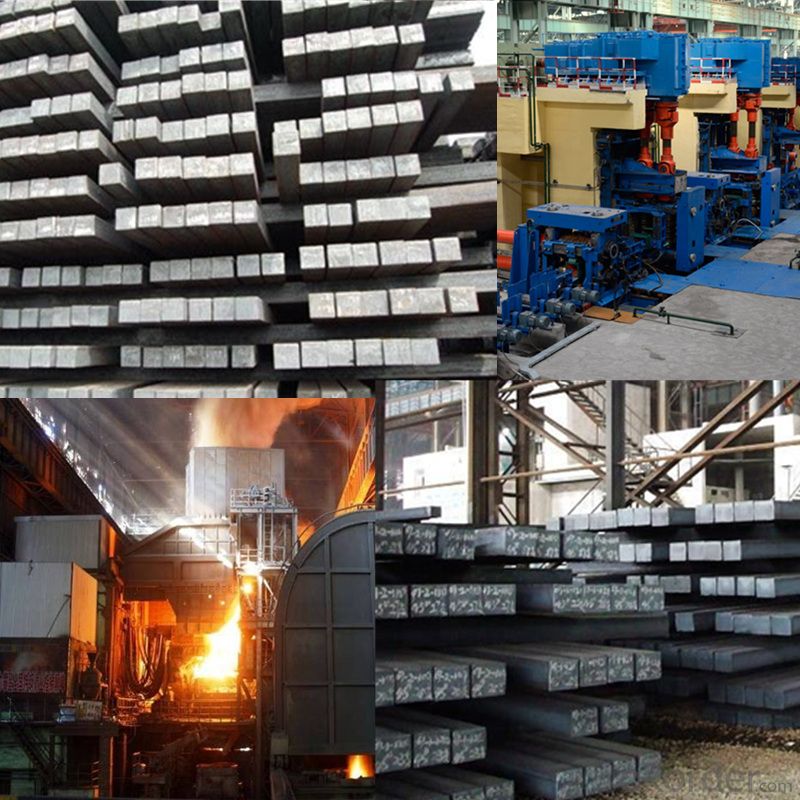
FAQ of Square Steel Billet Q235 3SP Grade Prime Quality 7#
We have organized several common questions for our clients,may help you sincerely:
1. How Can I Visit There?
Our company is located in Tianjin City, China, near Beijing. You can fly to Tianjin Airport Directly. All our clients, from home or aboard, are warmly welcome to visit us!
2. How Can I Get Some Sample?
We are honored to offer you sample.
3. Why choose CNBM?
Our delivery time about 15-20days for standard sizes, if you have other requirements like hardness, quanity and width ,it is about 20-40days. But don't worry we also try our best for the delivery time ,because time longer and our cost is higher.
- Q:How are steel billets used in the production of pipes?
- Pipes rely heavily on steel billets as a vital raw material. To commence the manufacturing process, the billets undergo multiple transformations. To begin with, the steel billets are subjected to high temperatures, rendering them pliable. This procedure, known as hot rolling, enables the billets to be molded into lengthy cylindrical shapes. The heating process not only enhances the steel's internal structure but also eliminates any impurities. Once the billets have been heated, they are passed through a series of rolling mills. These mills gradually reduce the size of the billet, shaping it into a round bar called a "bloom." Subsequently, the bloom is further processed by traversing a piercing mill, which forms a hollow cavity in the center. Following the piercing process, the bloom is elongated and molded into a pipe through continuous rolling. The elongation is achieved by guiding the bloom through a sequence of sizing mills, gradually stretching and shaping it to the desired pipe dimensions. This continuous rolling process ensures uniform thickness and shape throughout the pipe's length. Moreover, steel billets can also be employed in the production of seamless pipes. In this scenario, the billets are heated and pierced in a manner similar to the aforementioned process. However, instead of elongation through rolling, the pierced billet is subjected to further processing known as extrusion, where it is elongated and reduced in diameter. This results in a seamless pipe devoid of welded joints, a preference in industries such as oil and gas. In summary, steel billets play an indispensable role in pipe manufacturing. Through processes involving heating, rolling, and shaping, the billets are transformed into pipes of various sizes and types. These pipes find applications in diverse industries, including construction, infrastructure, and energy, facilitating the transportation of fluids and gases.
- Q:How are steel billets used in the manufacturing of pressure vessels?
- Steel billets are an essential component in the manufacturing of pressure vessels. These billets, which are semi-finished metal products, are typically made through a process called casting or extrusion. They are shaped into a solid square or rectangular form, ensuring a consistent and uniform material for further processing. To start the manufacturing process, the steel billets are heated to a specific temperature to make them more malleable and easier to work with. Once heated, they are placed into a forging machine, where they are subjected to intense pressure and shaping. This forging process helps to eliminate any defects or inconsistencies in the billet's structure, resulting in a stronger and more durable material. After forging, the steel billets are further processed through various techniques, such as rolling or machining, to achieve the desired dimensions and shape required for pressure vessel fabrication. These techniques help to refine the billet's surface finish and improve its mechanical properties. Once the billets have been shaped and processed, they are cut into smaller sections, which serve as the building blocks for pressure vessel construction. These sections are then welded together to form the shell of the vessel, ensuring a tight and secure seal to contain the high-pressure fluids or gases. The use of steel billets in pressure vessel manufacturing is crucial because of their superior strength, durability, and resistance to high-pressure environments. The uniformity and consistency of the billets provide a reliable material for fabricating vessels that can withstand extreme conditions and ensure the safety and integrity of the contents within. In summary, steel billets play a vital role in the manufacturing of pressure vessels as they provide the foundation for constructing the vessel's shell. Through a series of heating, forging, and processing techniques, the billets are transformed into strong and durable sections that are then welded together to form the final vessel. The use of steel billets ensures the structural integrity and reliability of pressure vessels, making them suitable for a wide range of industrial applications.
- Q:What are the main factors affecting the tensile strength of steel billets?
- The main factors affecting the tensile strength of steel billets include the chemical composition of the steel, the heat treatment process, the presence of impurities or defects in the material, the grain size and orientation, and the processing conditions used during manufacturing.
- Q:What are the different surface treatments for improved weldability in steel billets?
- There are several surface treatments that can be used to improve weldability in steel billets. These include processes such as pickling, grinding, and shot blasting. Pickling involves removing any surface impurities or oxides through the use of acid solutions. Grinding helps to smooth out any rough or uneven surfaces, ensuring better contact and fusion during the welding process. Shot blasting uses high-speed projectiles to clean the surface and create a rough texture, which enhances the adhesion of the weld. These treatments help to remove contaminants and improve the overall quality and weldability of the steel billets.
- Q:How are steel billets used in the production of gear blanks?
- Steel billets are used in the production of gear blanks as they serve as the raw material for shaping and forming the gears. The steel billets are heated and forged into the desired shape, and then machined to create the gear blanks. These gear blanks are further processed and finished to become fully functional gears, which are then used in various machinery and equipment.
- Q:How is the demand for steel billets projected to change in the future?
- Various factors are expected to cause significant changes in the demand for steel billets in the future. One of the main drivers of this change is the overall expansion of the construction and infrastructure sectors. As economies continue to develop, there will be an increasing need for steel billets to support the construction of buildings, bridges, roads, and other infrastructure projects. Moreover, the demand for steel billets is also expected to be influenced by the automotive industry. The rising popularity of electric vehicles and the need for lightweight materials to enhance fuel efficiency may lead to the substitution of steel billets with alternative materials like aluminum or carbon fiber in certain automotive applications. Furthermore, the renewable energy sector is another potential factor that could impact the demand for steel billets. As the world shifts towards cleaner energy sources, there will be a growing requirement for wind turbines and solar panels, which predominantly rely on steel. This could result in an increased demand for steel billets in the production of these renewable energy components. Additionally, advancements in technology and manufacturing processes may also affect the demand for steel billets. As new techniques and materials are developed, there is a possibility that steel billets could be replaced by alternative materials or manufacturing methods that offer superior performance or cost-efficiency. In conclusion, while the demand for steel billets is projected to remain strong in the foreseeable future, it is likely to undergo changes based on the growth of construction, infrastructure, automotive, and renewable energy sectors, as well as advancements in technology and materials.
- Q:How do steel billets contribute to the construction of bridges and infrastructure?
- Steel billets are essential to the construction of bridges and infrastructure as they serve as the raw material for manufacturing various structural components. These billets, which are heated and then shaped into desired forms, provide the necessary strength and durability required to withstand heavy loads and harsh environmental conditions. They are frequently used to fabricate beams, columns, and other critical elements that make up the skeletal framework of bridges and infrastructure projects. Additionally, steel billets can be further processed to produce reinforcing bars, which enhance the structural integrity of concrete structures, such as foundations and roadways. Overall, steel billets play a vital role in ensuring the structural stability and longevity of bridges and infrastructure, making them indispensable in the construction industry.
- Q:What are the main advantages of using steel billets in manufacturing?
- There are several main advantages of using steel billets in manufacturing. Firstly, steel billets are known for their exceptional strength and durability. This makes them ideal for manufacturing various products that require high tensile strength and resistance to wear and tear. Whether it's automotive parts, construction materials, or industrial equipment, steel billets provide the necessary strength and reliability. Secondly, steel billets offer excellent machinability. They can be easily shaped, cut, and formed into different shapes and sizes, making them highly versatile in manufacturing processes. This allows manufacturers to create complex and intricate designs with precision, ensuring the production of high-quality finished goods. Furthermore, steel billets have excellent thermal conductivity and can withstand extreme temperatures. This makes them useful in industries where heat resistance is required, such as in the production of heat exchangers, boilers, and other industrial applications. The ability of steel billets to maintain their structural integrity even under high temperatures makes them highly reliable in demanding manufacturing environments. In addition, steel billets are readily available and cost-effective. Steel is one of the most commonly used materials in manufacturing, making it easily accessible in the market. The abundance of steel billets ensures a consistent supply for manufacturers, reducing production delays and costs associated with sourcing materials. Lastly, steel billets have excellent corrosion resistance. This makes them suitable for manufacturing products that are exposed to harsh environmental conditions or corrosive substances. By using steel billets, manufacturers can ensure that their products maintain their integrity and functionality even in challenging environments. In conclusion, the main advantages of using steel billets in manufacturing include their exceptional strength, machinability, thermal conductivity, availability, cost-effectiveness, and corrosion resistance. These qualities make steel billets a preferred choice for various industries, enabling the production of high-quality, durable, and reliable products.
- Q:What is the average cost of steel billets?
- Several factors can influence the average cost of steel billets, including the type of steel, market conditions, and global supply and demand. Steel billets are semi-finished metal products commonly used as raw materials for various steel products. As of September 2021, the average price of steel billets ranges from $400 to $600 per metric ton. However, it is important to be aware that this price can fluctuate significantly due to factors such as changes in raw material costs (such as iron ore and scrap metal), energy prices, transportation costs, and market dynamics. Furthermore, specific countries or regions may experience variations in the average cost of steel billets due to regional factors like import tariffs, trade restrictions, and currency exchange rates. It is always recommended to seek advice from industry experts, steel suppliers, or consult market reports for the most accurate and up-to-date information on the current average cost of steel billets.
- Q:What are the potential applications of steel billets in the agricultural sector?
- Steel billets have various potential applications in the agricultural sector. They can be used for constructing sturdy and durable farm equipment such as plows, harrows, and trailers. Additionally, steel billets can be employed in the fabrication of storage tanks, silos, and barns, ensuring the safe and secure storage of agricultural produce. The strength and resilience of steel billets make them ideal for building infrastructure and structures that can withstand harsh environmental conditions, enhancing the efficiency and productivity of agricultural operations.
1. Manufacturer Overview |
|
|---|---|
| Location | |
| Year Established | |
| Annual Output Value | |
| Main Markets | |
| Company Certifications | |
2. Manufacturer Certificates |
|
|---|---|
| a) Certification Name | |
| Range | |
| Reference | |
| Validity Period | |
3. Manufacturer Capability |
|
|---|---|
| a)Trade Capacity | |
| Nearest Port | |
| Export Percentage | |
| No.of Employees in Trade Department | |
| Language Spoken: | |
| b)Factory Information | |
| Factory Size: | |
| No. of Production Lines | |
| Contract Manufacturing | |
| Product Price Range | |
Send your message to us
Square Steel Billet Q235 3SP Grade Prime Quality 7#
- Loading Port:
- Tianjin
- Payment Terms:
- TT OR LC
- Min Order Qty:
- 2000 m.t
- Supply Capability:
- 50000 m.t/month
OKorder Service Pledge
OKorder Financial Service
Similar products
New products
Hot products
Hot Searches
Related keywords
